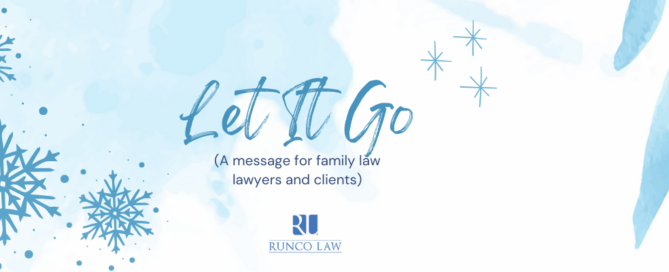Latest Blog
Previous Blogs
“Let It Go” (A message for family law lawyers and clients)
(To the melody of “Let It Snow” by Dean Martin)Oh, the work keeps piling up, it’s frightful,And I’m dreaming of rest and sleep, it’s delightful,But since I met my billings quota and have enough dough, [...]
Deal or No Deal Have the Parties Reached a Binding Agreement, or Are They Still Negotiating?
Introduction Over the course of my 30+ years in practice, I derive the most pleasure from resolving cases out of court, without the need to litigate the matter, or leaving it to a judge to [...]
“I’m Vexxed” (What it Means for a Party to be Declared a Vexatious Litigant, and How to Avoid It)
Introduction Over my 30 plus years of practice, I have seen plenty of family law clients who dislike their former partner. I mean really dislike. Hate, despise, loathe – look at a thesaurus and pick [...]
HEY, HONEY, CAN I ASK YOU A QUESTION? – ARE WE MARRIED? (WHAT MUST A PERSON PROVE TO SHOW THAT THEY ARE MARRIED)
Introduction As we are in full bloom of the spring of 2025, I have some weddings to go. Despite the obvious cynicism that many family lawyers have about people getting married, I must confess that [...]
“Say It, Say It! (But Say It Properly) The Art and Science of Drafting Affidavits in Family Law Matters
Introduction As an ode to glorious decade of music in the 1980s, the title of this blog is an homage to the 1986 song, “Say It, Say It,” by E.G. Daily, who talks about how [...]
FINDING YOUR HOME ON THE RANGE (DETERMINING THE PROPER LEVEL OF SPOUSAL SUPPORT – TO RECEIVE OR TO PAY – UNDER THE SPOUSAL SUPPORT ADVISORY GUIDELINES)
Introduction A little while back, I wrote a blog on the issue of spousal support, and discussed the issues of entitlement, quantum, and duration. I did touch upon the issue of establishing how much support [...]
A New Path Forward – Binding Judicial Dispute Resolution
Introduction It should come as no surprise to anyone that there is a backlog of cases set to be resolved in the judicial system, whether it be civil, criminal or family. I could not do [...]
New Year, New Me, Old Child Support Obligations? (Claiming and Defending Claims for Retroactive Child Support)
Introduction As the calendar has flipped and we are in a new year, things often seem possible in January that didn’t look that way in December. A fresh start for some, perhaps a chance for [...]
Someday at Christmas (A hope for this family law lawyer)
(To the melody of “Someday at Christmas” by Stevie Wonder) Someday at Christmas, men will be glad, When the mother of their child admits to them being the dad.They just want to be involved, they only [...]

